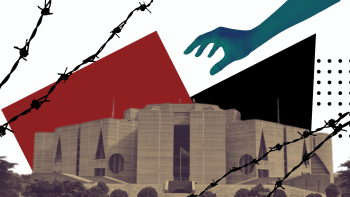A good national address to start with

The chief adviser's much-awaited address to the nation came a little over two weeks after Dr Muhammad Yunus had taken over the helm of Bangladesh under unique circumstances. The Nobel peace laureate was on his way back from the Paris Olympics when people back home had already chosen him to lead the interim government. It rarely happens that a leader is chosen by national consensus because of adulation and respect. That was three weeks ago. In the meantime, there were a couple of questions that made the rounds: the interim government's mandate and tenure.
The Yunus-led government is a result of a student protest for reform that turned into an anti-government campaign and culminated in a people's uprising that toppled an iron-clad regime of 15 years. Sheikh Hasina's dictatorial regime had destroyed the institutions necessary for a functional state with respect for law and order. The 84-year-old professor of economics, renowned around the world for his social business concept, was a victim of the previous regime himself. Hence, reforms were always going to be a priority for the incumbents. There was a slight indication to the nature of reforms as Yunus mentioned them briefly to a reception of diplomats earlier this month, and some isolated mentions from some of the advisers. But this was the first time that the chief adviser elaborately laid out his vision of the reforms, for which he must be commended.
Dr Yunus also touched upon certain challenges and urged the people to bear with him and have patience. As for the reforms, he predictably stressed on judiciary, law and order, administration, Election Commission, and the media. But the de facto prime minister also mentioned agriculture, health, and education. He mentioned a police commission and a banking commission. One of the advisers had previously mentioned media commission, but the chief adviser said he would carry out reforms to ensure free flow of information. He said the incumbents would take a strong stand against corruption. There is wholehearted agreement from most quarters that we need these reforms desperately. But there is also little doubt that all these reforms would take years, if not decades.
One might venture to say that while Dr Yunus laid out his elaborate vision of reforms, he sought the people's mandate to endorse it—or rather, that he would like the people to set the limit, hence his mention of "the bare minimum that must be done."
Having laid out his vision of reforms, the chief adviser rightly left it up to the political forces and the people. He mentioned twice in the same breath that his tenure and mandate would only be a reflection of the people's will, and that his government's tenure was entirely a matter of political decision. One can only interpret that as the incumbents' attempt to secure political as well as social acceptance of the government's reforms as well as its tenure.
One might venture to say that while Dr Yunus laid out his elaborate vision of reforms, he sought the people's mandate to endorse it—or rather, that he would like the people to set the limit, hence his mention of "the bare minimum that must be done." We recognise that the 170-plus million people of this country do not have a mechanism at their disposal through which they may express their opinion. Hence, it would perhaps be most prudent for the incumbents to achieve this through dialogue with experts, interest groups, researchers, academics and practitioners of the field. These people will then be able to set the ceiling.
At the same time, there is the important question of the interim government's tenure which, as Dr Yunus rightly said, has to be a purely political decision. But one must caution that his understanding of political acceptance must stem from having listened to the whole cross-section of the people.
Since many people are frustrated with predatory politics and the winner-take-all culture, engagement with the full spectrum of current political forces would still not mean full representation of the electorate. The chief adviser has only spoken to centre-right-leaning parties in his attempt to engage the political parties. Surely, the absence of leftist progressive liberal forces among his audience was an accidental omission. One can only presume that the omission of the 14-party alliance was out of practicality.
Hence—short of a referendum, which has its limitations and may well prove to be impractical under the circumstances—this regime would do well to engage with a broad range of stakeholders to ascertain public opinion. These could include professional bodies, businesses, students, trade unions, and the wider civil society.
Most Bangladeshis see this transition as an opportunity to rebuild the country. They are eager to cooperate and help the government in any way they can. These dialogues must begin soon before the exuberance subsides.
Tanim Ahmed is a journalist at The Daily Star.
Views expressed in this article are the author's own.
Follow The Daily Star Opinion on Facebook for the latest opinions, commentaries and analyses by experts and professionals. To contribute your article or letter to The Daily Star Opinion, see our guidelines for submission.


 For all latest news, follow The Daily Star's Google News channel.
For all latest news, follow The Daily Star's Google News channel. 










Comments